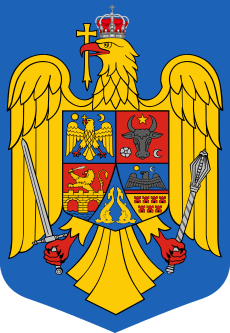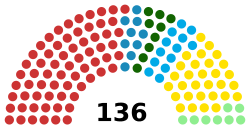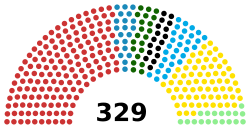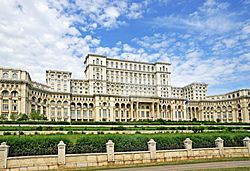Parliament of Romania facts for kids
Quick facts for kids Parliament of RomaniaParlamentul României |
|
|---|---|
| LV Legislature | |
 |
|
| Type | |
| Type | |
| Houses | Senatul Camera Deputaților |
| History | |
| Founded | 1862 |
| Leadership | |
|
Călin Popescu-Tăriceanu, ALDE
Since 10 March 2014 |
|
| Structure | |
| Seats | 136 Senators 329 Deputies |
 |
|
|
Senate political groups
|
Government (81)
Opposition (55)
|
 |
|
|
Chamber of Deputies political groups
|
Government (158)
Opposition (156)
|
| Senate committees |
15
- The Committee for legal affairs, appointments, discipline, immunities and validations;
– Committee on Budget, finance, banking and capital market; – The commission for economy, industry and services; Committee on Agriculture, Forestry and Rural Development; – The Committee on Foreign Affairs; Committee on public administration, the territory and environmental protection; – The Commission for defense, public order and national security; – Commission for work, family and social protection; Committee for Education, Science, Youth and Sports; – Committee on Public Health; Committee for culture, art and media information in the table; – Commission on Human Rights, religious and minority; The Committee on Equal Opportunities; – Commission for privatization and management of state assets; – Committee on research abuses, corruption and petitions; |
| Chamber of Deputies committees |
14
- Committee for Economic Policy, Reform, and Privatization;
– Committee for Budget, Finance, and, Banks, Committee for Industries and Services, Committee for Agriculture, Forestry, Food Industry and Specific Services; – Committee for Human Rights, Cults and National Minorities Issues; – Committee for Public Administration Territorial Planning and Ecological Balance; – Committee for Labour and Social Protection, Committee for Health and Family; – Committee for Education, Science, Youth, and Sport; Committee for Culture, Arts, Mass Information Means; – Committee for Legal Matters, Discipline, and Immunities; – Committee for Defense Public Order, and National Security; – Committee for Foreign Policy; – Committee for the Investigation of Abuses, Corrupt Practices, and for Petitions; – Committee for Standing Orders; – Committee for information technologies and communications; – Committee on Equal Opportunities for Women and Men |
|
Joint committees
|
Standing Committees
- The Committee on European Affairs;
– The former Committee for European Integration; – The Joint Standing Committee of the Chamber of Deputies and the Senate for the exercise of parliamentary control over the activity of the Romanian Intelligent Service; – The Joint Standing Committee of the Chamber of Deputies and the Senate for the exercise of parliamentary control over the activity of the Foreign Intelligent Service; – The Parliamentary Committee for the control of the implementation of the Law no.42/1990 for honoring the martyr heroes and granting rights to their successors, to the persons wounded in, and to the fighters for the victory of the Revolution of December 1990; – The Joint Standing Committee of the Chamber of Deputies and the Senate for the statute of the Senator and Deputy, and organizing and functioning of the joint sessions of the Chambers; – The Joint Standing Committee of the Chamber of Deputies and the Senate for the relation with UNESCO Special committees
- The Joint Standing Committee of the Chamber of Deputies and the Senate for the elaboration of the legislative proposal regarding the election of the Chamber of Deputies and the Senate, of the President of Romania, of the authorities of the public local administration, financing of the elections campaign, and the election of the members of the European Parliament;
– The Joint Special Standing Committee of the Chamber of Deputies and the Senate for the control of the budget execution of the Court of Accounts during the year 2003; – The Joint Special Standing Committee of the Chamber of Deputies and the Senate for establishing the antenna times for the election of the Romanian Members of the European Parliament; – The Joint Special Standing Committee of Parliament for the antenna times for the national referendum regarding the introduction of the uninominal election of the members of the Parliament of Romania Inquiry committees
- The parliamentary inquiry committee for investigations and clarifying the status of the bank accounts of Nicolae Ceaușescu;
– The parliamentary inquiry committee for investigations and clarifying the activity of ICE Dunărea; – The parliamentary inquiry committee for investigations regarding interception of communications; – The parliamentary inquiry committee of the Chamber of Deputies and the Senate regarding the Bordei Park; – The parliamentary inquiry committee for investigations and clarifying the spending way of the money obtained as a 2% quota from the privatization value, destined to the building of social housing, as established by the article 44, 2nd paragraph of the Law 10/2001 regarding the judiciary regime of the buildings abusively acquired by the state in the period 6 March 1945 – 22 December 1989, republished |
| Elections | |
| 1992 – 2008, 2016 - present: Closed list, D'Hondt method 2008 - 2016: Mixed member proportional representation |
|
|
Chamber of Deputies voting system
|
1992 – 2008, 2016 - present: Closed list, D'Hondt method 2008 - 2016: Mixed member proportional representation |
|
Senate last election
|
December 11, 2016 |
|
Chamber of Deputies last election
|
December 11, 2016 |
|
Senate next election
|
2020 |
|
Chamber of Deputies next election
|
2020 |
| Meeting place | |
 |
|
| Palace of the Parliament, Bucharest, Romania | |
| Website | |
| http://www.parlament.ro/ | |
The Parliament of Romania (Romanian: Parlamentul României) is the national legislature of Romania, consisting of the Chamber of Deputies (Camera Deputaților), and the Senate (Senat). Its meeting place is at the Palace of the Parliament in Bucharest.
Prior to the modification of the Constitution in 2003, the two houses had identical attributes. A text of a law had to be approved by both houses. If the text differed, a special commission (comisie de mediere) was formed by deputies and senators, that "negotiated" between the two houses the form of the future law. The report of this commission had to be approved in a joint session of the Parliament. After the 2003 referendum, a law still has to be approved by both houses, but each house has designated matters it gets to deliberate before the other, in capacity of "deciding chamber" (Romanian: cameră decizională). If that first chamber adopts a law proposal (relating to its competences), it is passed on to the other one, which can approve or reject. If it makes amendments, the bill is sent back to the deciding chamber, the decision of which is final.
In 2009, a referendum was held to consult the population about turning the parliament into a unicameral body and reducing the number of representatives to 300. Although the referendum passed, the results are not binding, a referendum explicitly mentioning the modification of the constitution being required to achieve this.
See also
 In Spanish: Parlamento de Rumania para niños
In Spanish: Parlamento de Rumania para niños

